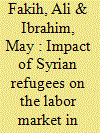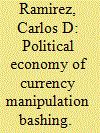| Srl | Item |
| 1 |
ID:
143600


|
|
|
|
|
| Summary/Abstract |
This paper analyzes time-sensitive data on a humanitarian crisis in the Middle East. It aims to assess the impact of the steep influx of Syrian refugees into Jordan on the country’s labor market since the onset of the conflict in Syria (March 2011). As of August 2014, nearly three million registered Syrians have sought refuge in neighboring countries (Lebanon, Jordan, Iraq, and Turkey), according to the United Nations High Commissioner for Refugees. Jordan and Lebanon are hosting the majority of them. This paper utilizes data regarding unemployment rates, employment rates, labor force participation, the number of refugees, and economic activity at the level of governorates. The vector autoregressive methodology is used to examine time series data from the most affected governorates in Jordan. The empirical results of Granger causality tests and impulse response functions show that there is no relationship between the influx of Syrian refugees and the Jordanian labor market. Our results are verified through a set of robustness checks.
|
|
|
|
|
|
|
|
|
|
|
|
|
|
|
|
| 2 |
ID:
129827


|
|
|
|
|
| Publication |
2014.
|
| Summary/Abstract |
Over the last decade, the Iranian Government budget on military has been higher than the average of the world. The current increasing international sanctions aim to reduce the military capabilities and capacities of the Iranian Government. We analyze the response of the Iranian economy to shocks in its military budget from 1959 to 2007, using impulse response functions and variance decomposition analysis. The Granger causality results show that there is unidirectional causality from the military spending growth rate to the economic growth rate. The response of income growth to increasing shocks in the military budget is positive and statistically significant.
|
|
|
|
|
|
|
|
|
|
|
|
|
|
|
|
| 3 |
ID:
124558


|
|
|
|
|
| Publication |
2013.
|
| Summary/Abstract |
In recent years, one of the most frequently debated issues in Congress has been the value of the Chinese renminbi (RMB) relative to the U.S. dollar. Many members of Congress often accuse China of being a "currency manipulator." This paper has two objectives. First, it investigates the extent to which PAC contributions from key interest groups as well as constituent interests influence the frequency with which members of Congress criticize China's exchange rate policy, controlling for other factors. The results indicate that the odds that a congressman will call China a "currency manipulator" are 1.35 times higher for every $5000 in PAC contributions from groups that favor legislation against China. In addition, the results show that a one percentage point increase in the share of the congressional district labor force in manufacturing is associated with a 19.6% increase in the likelihood that the district's legislator will label China a "currency manipulator." Second, this paper investigates the consequences that "currency manipulation" bashing may have on the rate at which the RMB appreciates against the U.S. dollar. The results for a VAR model indicate that an increase in the incidence of "currency manipulation" bashing appears to temporarily slow down, rather than accelerate, the rate at which the renminbi appreciates against the dollar. This result suggests that bashing China may actually be counterproductive.
|
|
|
|
|
|
|
|
|
|
|
|
|
|
|
|